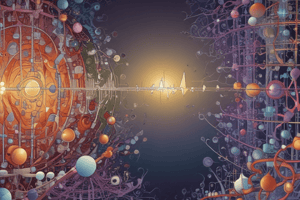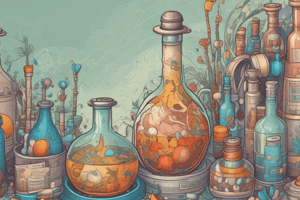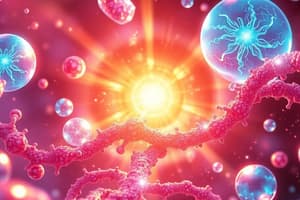Podcast
Questions and Answers
What is the process by which a drug is absorbed, distributed, metabolized, and eliminated from the body?
What is the process by which a drug is absorbed, distributed, metabolized, and eliminated from the body?
- Receptor binding
- Pharmacokinetics (correct)
- Pharmacodynamics
- Signal transduction
Which of the following is a type of protein target for drug binding?
Which of the following is a type of protein target for drug binding?
- Enzyme
- Receptor
- Channel
- All of the above (correct)
What is the process by which a drug interacts with a receptor to produce a response?
What is the process by which a drug interacts with a receptor to produce a response?
- Elimination
- Absorption
- Signal transduction (correct)
- Metabolism
What is the process by which a drug binds to a receptor, preventing another drug from producing a response?
What is the process by which a drug binds to a receptor, preventing another drug from producing a response?
What is the study of the effects of drugs on the body?
What is the study of the effects of drugs on the body?
What is therapeutics primarily concerned with?
What is therapeutics primarily concerned with?
What is toxicology a branch of?
What is toxicology a branch of?
What is the focus of toxicology?
What is the focus of toxicology?
What is the difference between therapeutics and toxicology?
What is the difference between therapeutics and toxicology?
What do therapeutics and toxicology have in common?
What do therapeutics and toxicology have in common?
What route of drug administration includes intravenous?
What route of drug administration includes intravenous?
Which of the following is NOT a type of parenteral route?
Which of the following is NOT a type of parenteral route?
What type of parenteral route is used for insulin administration?
What type of parenteral route is used for insulin administration?
Which parenteral route involves administration into a blood vessel?
Which parenteral route involves administration into a blood vessel?
What is the term for administration into an artery?
What is the term for administration into an artery?
What is one of the difficulties in delivering a drug intravenously?
What is one of the difficulties in delivering a drug intravenously?
Why is it important to respond rapidly when delivering a drug intravenously?
Why is it important to respond rapidly when delivering a drug intravenously?
What is a requirement for delivering a drug intravenously?
What is a requirement for delivering a drug intravenously?
What is a potential risk of rapid intravenous drug delivery?
What is a potential risk of rapid intravenous drug delivery?
Why is it important to have trained personnel when delivering a drug intravenously?
Why is it important to have trained personnel when delivering a drug intravenously?
What is the source of penicillins?
What is the source of penicillins?
What is the source of iron?
What is the source of iron?
Which of the following is an example of a chemically synthesized drug?
Which of the following is an example of a chemically synthesized drug?
What is the source of beef insulin?
What is the source of beef insulin?
Which of the following is not a source of minerals?
Which of the following is not a source of minerals?
Study Notes
Pharmacology Branches
- Pharmacokinetics involves Absorption, Distribution, Metabolism, and Elimination
- Pharmacodynamics involves Protein targets for drug binding, Receptor types, Signal transduction, and Drug antagonism
Drug Sources
- Natural sources:
- Animal (e.g. beef insulin)
- Microbes (e.g. penicillins)
- Earth and soil (e.g. minerals: iron, calcium, sulfur, and potassium)
- Chemical Synthesis (man-made) (e.g. pethidine and sulphonamides)
Therapeutics and Toxicology
- Therapeutics: using drugs to prevent, diagnose, or cure disease
- Toxicology: studying undesirable effects of chemicals on living systems, from individual cells to complex ecosystems
Routes of Drug Administration
Parenteral Administration
- Intravenous (I.V)
- Intra-arterial
- Intracardiac
- Subcutaneous (S.C, e.g. insulin)
- Challenges:
- Difficulty finding a suitable vein
- Risk of rapid response and toxicity
- Requires trained personnel
Studying That Suits You
Use AI to generate personalized quizzes and flashcards to suit your learning preferences.
Description
Test your understanding of pharmacokinetics, including absorption, distribution, metabolism, and elimination, as well as pharmacodynamics, including protein targets, receptor types, signal transduction, and drug antagonism.




